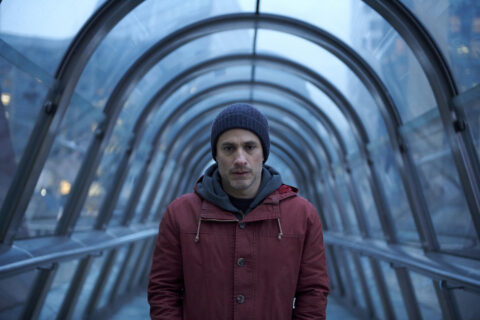Science fiction has the potential to help us imagine new and alternative worlds, to accommodate us to different ways of thinking, to provoke us and ask key questions about what it truly means to be human. Another End (Piero Messina, 2024) achieves almost none of this.
Gael García Bernal stars as Sal, a grieving widower drowning out his sorrow with beer, loud music and pills. In a strong opening moment, he visits his neighbour’s flat to fix her shower. While they’re talking, her husband is stripped naked and taken away by anonymous men in white coats, all caught in the mirror as the two sit down for tea. She’s blasé about the whole thing. It seems to happen a lot.
Messina does a fairly decent job of establishing the basic premise of this world, in which a mysterious company takes human bodies into a large warehouse — evoking the end of Raiders of the Lost Ark (Steven Spielberg, 1982) — and waking them up. As it turns out, these are hosts, implanted with the memories of dead ones. But don’t get excited: the fun stops there.
Egged on by his sister Ebe (Bérénice Bejo), Sal decides to go through with the strange experiment. His wife is back, at least when she’s not sleeping, but now in the body of a different woman (played by Renate Reinsve). This is all ripe for an evocative and challenging sci-fi, but the result feels like something you find at the bottom of the Tubi recommended list. Inexplicably, it’s in the Berlinale competition.
Both Bernal and Reinsve (the latter was particularly excellent in A Different Man [Aaron Schimberg, 2024]) are charming actors, but they are let down by a script that takes the easiest dialogue shortcuts and fails to establish any charm to make us care about the characters. This is especially true as the question of identity and who is who comes to the forefront.
There’s almost nothing to shout about visually. Shot in a grey filter that evokes the worst of Ridley Scott’s recent works, Another End is dreary and drab throughout. The anonymous city they live in, high-rises, endless glass and steel, a graffiti-laden metro, is uninspiring. Instead of looking like a dystopian evocation of the future, it could just be anywhere in the USA. Messina even makes a trip to the strip club boring.
Instead of finding genuine ways to turn on the emotion, Bruno Falanga’s loud and oppressive score, all Phillip Glass-power chords, forces you to feel it. Very tacky.
Perhaps it would’ve worked well as a one-hour Black Mirror (Charlie Brooker, 2011-) episode. Maybe back in season one when the novelty was still fresh. For 130 torturous minutes, Another End makes you wish you chose another film instead.
Redmond is the editor-in-chief of Journey Into Cinema.
